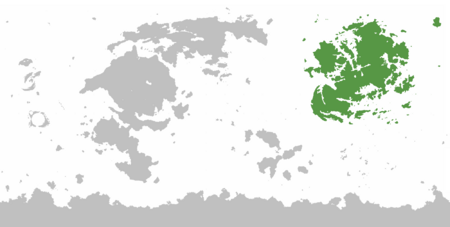Great Europan Collapse
 Wurld map with maximally impacted countries in green, and minimally in gray. | |
| Date | December 2006 to c. 2015 |
|---|---|
| Location | Wurldwide |
| Cause | (disputed)
|
| Outcome |
|
This article or section is in the process of an expansion or major restructuring. You are welcome to assist in its construction by editing it as well. If this article or section has not been edited in several days, please remove this template. If you are the editor who added this template and you are actively editing, please be sure to replace this template with {{in use}} during the active editing session. Click on the link for template parameters to use.
This article was last edited by Orioni (talk | contribs) 16 months ago. (Update timer) |
The Great Europan Collapse was a nearly decade-long period of noticeable national decline. It mainly affected the continent of Europa, with minor ripples throughout the Eurth. The impact and duration of the collapse were different in each country.
The collapse was caused by a combination of vulnerabilities. No singular reason can be pointed to. What caused it was a combination of corruption, economic bubbles, increase in government debt, and wide-scale inflation.
The collapse was felt differently in different parts of the glube. A lot of Europa's developed countries went through a very bad, long-lasting crisis. Many New Wurld countries with developed economies didn't feel as much of an impact. The Occident suffered minimal impact, in part due to its proximity to Argic markets.
Causes
WIP
- In 2018 this idea was discussed on the forums.[1] In 2021 the idea was revisited.[2]
- The collapse will likely involve a chain-reaction of some sort.
Effects
WIP. Here is what we know about this event from references collected on IIWiki.
- 2000s: Noble Nykia only fell in power in the early to mid 2000s Great Europan Collapse. However, Nykia is one of the few nations on the continent that did not fall to civil war or coups. Instead, it remained a key regional balancing force against the Occidental countries such as Tagmatium, Adaptus, and Great Anglia.
- 2005: A quick revolution took place in Niederoestereich led by the Army, workers and the middle class. A new Imperial system was imposed with ideals taken from nationalist and communist principles. The country changed its name to National Comrades of Niederoestereich.
- April 2006-May 2008: Most active mentions of Cyber Nations were posted during this period.
- 2006-2009: War in Zekistan. This can be the catalyst for closing the Jasmine Sea, causing problems in that part of Europa.
- 2009: The Entente of Oriental States held an emergency session on the Great Europan Collapse.
- 2010s: Immigration to Tagmatium reached a high in the early 2010s due to the Great Europan Collapse, which saw many established Europan nations suffer economic and political turmoil. Tagmatium itself mainly escaped, and this stability made it attractive to immigrants. An estimated 3 million net immigrants coming to Tagmatium in the period of 2010-2018, when the situation across Europa began to stabilise.
- 2010s: Collapse leads to major protests in Qubdi over food prices and unemployment. The President orders cuts to the price of basic consumer goods.
There are also some undated events.
- Hexanesa islands experienced a downturn in tourism.[3]
- “The alliance between Tagmatium and Akiiryu somewhat weakened as Akiiryu suffered through the Great Europan Collapse.”
- After a long history of confrontation and war with Haruspex, the Great Europan Collapse precipitated a civil war that only ended when Beautancus was annexed by the Sovereign Imperium. This, in turn, caused the Cussian Crisis and the 2020 Haru Civil War.
- “Volsci was largely unaffected by the Great Europan Collapse.” -> Because they are isolated?
- “Wajoka was one of the few economically stable states due to its few connections to the outside wurld.” -> Disconnection is good, interconnection is bad.
- “EOS membership also shielded Deltannia from the most dire effects of the Great Europan Collapse.” -> Some connection is good.
Policy responses
- EOS halts its space launch program.
- December 2015: Attempted restoration.[4]
- January 2016: Anti-piracy operations in Meteorolas.[5]
- August 2016: Anti-VLA war in Afropa.[6]
- Great Anglia uses the collapse as a reason to form the Occidental-Azanian Pact.
References
- ↑ https://www.europans.com/topic/4923-a-great-europan-collapse/
- ↑ https://www.europans.com/topic/4923-a-great-europan-collapse/?do=findComment&comment=40016229
- ↑ https://www.europans.com/topic/5825-in-from-the-cold/
- ↑ https://www.europans.com/topic/4030-reopening-international-relations/
- ↑ https://www.europans.com/topic/4092-the-imperial-navy-sets-sail/
- ↑ https://www.europans.com/topic/4141-war-on-violetist-liberation-army/